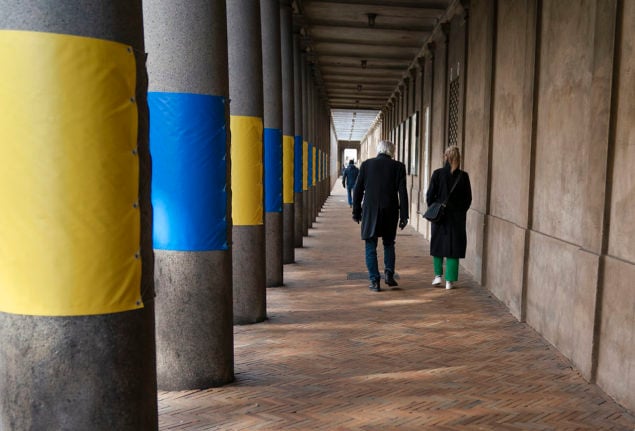The Danish parliament on Wednesday passed a special law giving Ukrainian refugees access to school, the labour market and social welfare in the Nordic country.
The law was enacted via an expedited parliamentary process following the Russian invasion of Ukraine in late February. Immigration Minister Mattias Tesfaye said on Thursday that “significantly more” than the 20,000 refugees currently planned for could eventually arrive in Denmark.
The “Ukrainian law” – officially, the Special Act on Displaced Persons from Ukraine – eases the process for Ukrainians compared to the normal asylum system, and is designed to enable them to start work and school as soon as possible after coming to Denmark.
The Danish Immigration Service and the Danish Agency for International Recruitment and Integration (SIRI), the authority which processes residency applications, have subsequently published an FAQ page with information about the application process and the rules under the new law.
The FAQ page can be viewed directly here, and is available in Danish and English. The information in this article is taken from the official information page and aims to summarise and explain the process of application for residency for Ukrainian refugees in Denmark.
Who can apply for residence under the special law?
To be able to apply for residence under the law, you must fulfil one of the following criteria:
- You are a Ukrainian citizen and left Ukraine on February 24th 2022 or later, and resided in Ukraine at the time you left
- You had refugee status in Ukraine on February 24th 2022 and left the country on that date or later
- You are a Ukrainian citizen or had refugee status in Ukraine on February 24th 2022 and were in Denmark, or had legal residence in Denmark, on that date.
Under a separate clause of the law, close family members (spouses, partners, children under 18 and other close family members who are dependents) of people who fulfil the above categories can also be granted residence.
You must be in Denmark to apply for residency under the law unless you are applying under the close family member clause.
How do I apply?
To apply for residency under the law you must fill out and submit form SL1. This can be done online (using this link), in which case it will be sent digitally to the Danish Immigration Service (Udlændingestyrelsen).
The form can also be printed and filled in manually. It can be downloaded as a word or pdf file.
Whether submitting paper or digital forms, applicants must make an appointment with Denmark’s Borgerservice – Citizens’ Service – to submit biometric information. Appointments are made at this link.
If you are submitting your application as a paper form, you must bring it (and accompanying documentation such as ID) to this appointment. You should also bring any children who are applying with you as well as their documentation and paper application forms (if you are using this version). Both the original and a copy of identity documents such as passports should be brought.
There are four locations in Denmark where you can attend biometry appointments: Odense, Aalborg, Aarhus and Næstved. The latter is the closest to Copenhagen.
If you are applying on another person’s behalf (who may not be in Denmark), you must use form SL2 (word and pdf).
These forms must also be submitted by making an appointment at Borgerservice (see above) to submit biometry. If the applicant is not in Denmark, they can submit biometry at a Danish embassy or consular service. You can find details for where these are located here.
Both forms contain guidance as to how they must be filled out. They are only available in English at the current time, although the Immigration Service says it is working on a Ukrainian language version.
Where can I live?
Ukrainians who have applied for residence under the law will be offered a place at an asylum centre while their applications are being processed, but this is not a requirement. They may also stay at private homes or with friends and family.
The Immigration Service will, however, decide which municipality you will live in if your application is approved. You can request a preferred municipality, for example if you already have friends or family there.
Can I work?
Residence permits issued under the law give the right to work in Denmark, but you cannot work until the permit has been issued – in other words, you can’t work while your application is being processed. You may look for work and agree a contract during this time, but are not permitted to begin working until the permit has been issued.
If you are offered a job while your application is being processed you should inform the Immigration Service, because this may effect the municipality in which you are given residence.
Did we miss anything out? Do you have any other questions related to this article you’d like answered? Let us know.



 Please whitelist us to continue reading.
Please whitelist us to continue reading.
Member comments